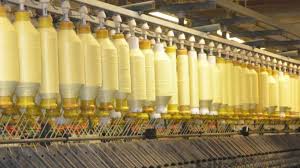Indian yarn industry poised for expansion on back of global growth recovery

The IMF’S upward revision of global growth to 3.1 per cent for 2024 is bringing positive tidings for India's yarn industry, which is poised for a significant expansion. This resilience in major economies, coupled with infrastructure improvements, a focus on self-sufficiency in raw materials, and a drive for innovation, is creating a perfect storm for growth in the sector.
Leading the pack is Sagar Manufacturers from Madhya Pradesh, a company exporting to over 20 countries. The company, with a daily production capacity of 150 tonnes of polyester cotton yarn, is gearing up for a major expansion, aiming to increase its processing capacity to 600-700 tonnes per month. Siddharth Sudhir Agrawal, the Managing Director, is optimistic about market conditions improving soon.
Similar sentiments are echoed by Amarjothi Spinning Mills, a producer of color melange yarn for various textiles. The company, which caters to global brands like Adidas and H&M, has witnessed a gradual improvement in the market and expects this growth trajectory to continue through 2024. With a daily yarn production of 60,000 kg and an annual revenue of Rs 300 crore, the company is a key player in the textile industry.
Sanathan Textiles, a producer of diverse yarn types, also foresees a rise in demand, particularly for cost-effective filament yarn as it gains popularity over cotton. Director Mikesh Dattani highlights the growing domestic market, which currently comprises 80 per cent of their production.
NSL Textiles, on the other hand, is expecting a resurgence in European markets while strategically shifting focus to meet domestic demand. The company, a strong advocate for sustainable practices, emphasizes integrated operations from seed to garment.
As the industry rebounds from recent geopolitical challenges, diversification and development of value-added products are emerging as key strategies. Sustainability is becoming an increasingly crucial factor, with major brands demanding eco-friendly practices throughout the supply chain. Industry leaders are actively exploring niche segments and specializing in products to stay ahead of the curve and drive future growth.
